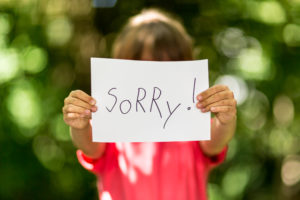
How to Teach Your Child to Apologize?
When our children have caused physical damage or emotional damage, we immediately expect them to apologize. This usually looks like them saying “sorry” and them thinking that everything is now fine.
However, sometimes the hurt is deep and there needs to be some time for healing to take place and some evidence that the other person is trying to make amends.
How do you teach your child to apologize meaningfully?
When I explain the concept of apologizing to children, I use the concept of a bridge that connects two people. If we think of the bridge as a symbol for our relationship with someone, they can imagine how a connection between two people needs to be strong. However, when that relationship gets damaged physically or emotionally, it is as if the bridge has crumbled.
The bridge represents TRUST between two people.
To rebuild a relationship/trust or a bridge, takes time and effort.
To make an apology more meaningful than just saying “sorry”, we can ask our kids and teens to come up with a way to make amends.
How can they repair the damage they’ve caused?
For younger children, you might need to give ideas such as making a card, drawing a picture, picking some flowers from the garden, letting the other person play with your favourite toy etc.
As children get older, they can give another child a wagon ride, or make them a hot chocolate, write a note, or do some baking for them etc.
For teens they can make a dinner for the people they’ve hurt, mow the lawn, wash the car (or other above-and-beyond responsibilities for which they might usually get paid), buy flowers, make something, or actually do the repair if they physically damaged something.
By asking the child to make amends, it returns the responsibility to the child. This is very important because it keeps the child accountable but not bitter and resentful. They realize that they’ve messed up and that it’s up to them to make it right – to do the repair.
The word re-pair literally means to become a pair again.
If the parent is the one who has caused damage by raising their voice, shaming etc. it is very important for the parent to role model what repair looks like.
To read my previous article on this topic: The 3Rs of Parenting: Repair, Reconnect, Revive, click here. Children learn to apologize from seeing their parents apologize to each other and to them.
I have also written a previous post on Teaching the 5 Languages of Apology to Children summarized from the work of Dr. Gary Chapman and Dr. Jennifer Thomas.
For sibling rivalry, I recommend reading my previous article here.
To put the bridge analogy into action with your younger children, you could build a bridge with lego and then break it and show how much time and effort it takes to rebuild it.
I hope this has given you some ideas on how to teach your child to apologize,
Wishing you a wonderful week of repairing and reconnecting,
Warmly,

PS. Registration has just opened for my next round of “Brain Science” groups to teach children ages 7-9 years and 10-12 years anxiety management skills. These groups will start in September and will run for seven Thursdays after school. (There is also a 15 minute parent feedback component for each session). To register online and read more about these groups, please click here and then go to “upcoming groups/events”.
PPS. If you and your child are interested in going to some fabulous classical music concerts with expert musicians, please take a look at the Blueridge Music Festival agenda for their upcoming concerts in North Vancouver, Downtown Vancouver and Kitsilano. This is a great way to expose your child to classical music – traditional and contemporary.
Want to Connect?
Subscribe now to receive free weekly parenting tips and inspiration.






